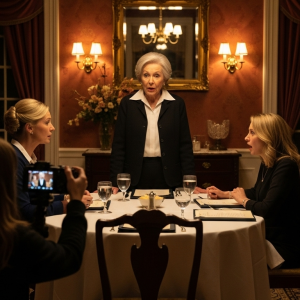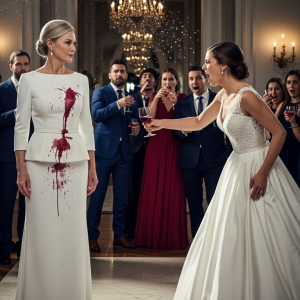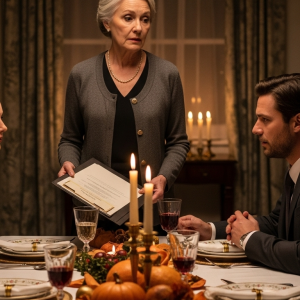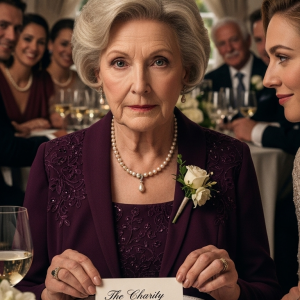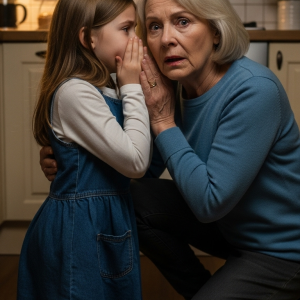The holidays had always been a time of warmth. At least, that’s what I believed until one cruel remark from my daughter-in-law shattered that illusion. It wasn’t just about Christmas; it was about my place in their world—a world where I no longer belonged. But what happens when you’ve been pushed too far? This is my story.
Christmas, the time of year for celebrating love and togetherness. Or so I thought. I’m Sophie, seventy-four years old, living quietly in my little house by the sea. Peace, simplicity, and the memory of my late husband had always been enough for me. I thought I understood my place in the world. I was wrong.
That year, my son Daniel decided to spend Christmas with his wife Laura’s wealthy family in their lavish home. At first, I thought their invitation was a kind gesture. But then Laura, with her icy, superior smile, spoke the words that would change everything.
“You just don’t fit in with my family, Sophie,” she said, her voice dripping with disdain. “You’re too old, too simple. It’s just not the right setting for you.”
I stared at her, the woman who had married my son. I felt my throat tighten as she dismissed me like an inconvenience. And Daniel, my own son, just stood there, his eyes avoiding mine. His loyalty was with Laura, and I was no longer a part of their life.
“I’m sorry, Mom,” he said softly. “Laura thinks it’s better if you don’t come.” And just like that, I was cast aside, a relic of the past. That night, I didn’t cry. I held my tears back, but inside, something broke.
My old friend Margaret heard what happened. “Sophie,” she said, her voice warm over the phone, “don’t you dare sit there alone. We’ll bring Christmas to you.” And they did. My friends arrived with food, laughter, and a fierce loyalty that felt like a lifeline.
As we sat around my table, I mentioned the beach house, the one my husband and I had worked our whole lives to buy. It had always been my plan to leave it to Daniel. It was his legacy, too.
But in that moment, surrounded by my true friends, I realized something. Maybe Daniel didn’t deserve it. My friend Anna looked at me with kind eyes. “Sophie, you’ve earned that house. You don’t owe them anything, especially not after how they treated you.”
Her words hit me with the force of a physical blow. I had been blind. Love was supposed to be mutual, wasn’t it? A spark ignited inside me, a decision forming. I wasn’t just going to give them the house. Not anymore. That night, after my friends left, I took out the will I had written years ago. With a steady hand, I drew a line through Daniel’s name as the sole heir.
As I prepared to reclaim what was rightfully mine, I knew it wasn’t just the house I was taking back. It was my dignity. It was my power. The quiet, overlooked woman was done staying in the shadows.
The loneliness in the following days was suffocating. I wandered aimlessly around the house, the silence a constant reminder of what had been lost. I had been a good mother. I had supported Daniel through thick and thin, and yet he had discarded me like yesterday’s news. The house, our sanctuary, now felt like the prize in a war I never wanted to fight.
I wasn’t going to let Laura or Daniel have it. Daniel hadn’t earned it, not the way my husband and I had. As I sat at my desk, the sound of my pen scratching across the paper filled the room. I signed my name with determination. The house would no longer be his. A strange sense of calm settled over me. I had made my choice.
The quiet didn’t last long. A few weeks after Christmas, the phone rang. It was my lawyer, Thomas, his voice strained with an unease I’d never heard from him before. “Sophie, we need to talk. It’s about your will. Something has changed.”
My chest tightened. I knew, with a sickening certainty, that Daniel had found a way to interfere. When I arrived at his office, Thomas could barely meet my eyes. “Sophie, I need to explain,” he began, his voice uncharacteristically soft. “Your son, Daniel… he’s been coming in, asking for changes to the will. He insisted you would want them, that the house should go to him.”
The words barely registered. “You’ve been changing my will without my consent?” My blood ran cold.
He lowered his eyes. “I’m sorry, Sophie. He kept insisting he was just helping you. He said you were getting forgetful, that you wanted to make things easier for everyone. I should have questioned it, but I didn’t.”
Daniel hadn’t just gone behind my back; he had gaslit my own lawyer, painting me as a confused old woman incapable of making her own decisions. The betrayal was so profound, it felt like a physical wave crashing over me. I was being erased.
“How much did he pay you to betray me?” I whispered, my voice shaking with a rage I didn’t know I possessed.
“No, Sophie, it wasn’t like that!” he stammered. But I was already heading for the door. I had been underestimated for the last time. As I drove home, my thoughts a whirl of fury, I knew I couldn’t let them have it. This wasn’t just about a house anymore. This was a battle for my own sanity.
The phone call from Daniel came three days later. His voice was thick with an anger that mirrored my own. “Mom, you need to fix the will. You can’t just take the house away from me and Laura.”
“You think you can just talk to me like everything is fine?” My voice trembled, but I held my ground. “You’ve already tried to steal from me. What makes you think I’ll give in this time?”
He tried the soft, pleading tone he always used to manipulate me. “It’s just the house, Mom. It’s about family. It’s what Dad would have wanted.”
At that, my heart cracked. Using my late husband’s memory against me. “You don’t know what Dad would have wanted,” I said, my voice barely a whisper. “This is about respect, and you’ve lost mine.”
There was a long silence, then his voice turned cold, resolved. “Mom, if you don’t change your mind, I’ll have to take action. I’ll go to court. I’ll make sure I get what’s mine.”
He would fight me. He would tear our family apart for a house. “I’ll see you in court, Daniel,” I said, my voice sharp and final. “And don’t you dare call me again until you’ve decided if you want a mother or a piece of property.”
I hung up, refusing to let the tears fall. That night, I met with a new lawyer, a young, sharp man named Richard. As I laid out the whole sordid story, I felt the anger and frustration pouring out of me.
“Don’t worry, Sophie,” he said when I finished, his face full of sympathy. “You have a strong case. If your son wants a fight, we’ll give him one.” For the first time in weeks, I felt a flicker of hope. I wasn’t alone in this battle.
The days that followed were a blur of legal preparations. Daniel’s threats echoed in my mind. He was no longer the boy I raised; he was a cold, calculating man, willing to destroy me for his own benefit. What hurt most was that he was willing to throw me away, his own mother, without a second thought. Laura had turned him against me, making him believe I was nothing more than an obstacle.
I met with Richard several times, reviewing documents, building our case. But as I listened to him explain the legal strategies, I realized something I hadn’t allowed myself to acknowledge before: I was scared. Scared of losing everything, scared of the toll this would take on me, scared of the family I had once known being completely destroyed. But I couldn’t back down now.
The morning of the court hearing was cold and grey. I stood before the mirror, my hands trembling as I adjusted my jacket. This wasn’t just a fight for a house. It was a fight for my dignity, for my right to be seen and respected.
The courtroom was already crowded when we entered. Daniel and Laura sat across the room, their expressions cold and distant. I saw how tightly Laura gripped Daniel’s hand, as if willing him to be strong. Richard stood by my side, a calm and confident presence. He laid out the facts clearly: Daniel’s manipulation of the will, the complicity of my former lawyer, Thomas, and the fact that Daniel had acted without my consent.
When it was my turn to speak, I stood, my legs unsteady but my voice strong. I looked directly at my son. “I never expected this,” I began, my voice unwavering. “I never expected my own son would try to take something that wasn’t his, something I worked my whole life for. But more than that, I never expected him to throw me away, to think so little of me that he would try to erase me from his life.”
I could see Daniel’s eyes flicker. Laura scoffed.
“I raised him,” I continued, my voice now filled with the pain of years of sacrifice. “I loved him. I gave him everything I had. And in return, I became an inconvenience to be discarded. This house is not just a building. It is a symbol of everything my husband and I worked for. And I will not let you take it from me.”
The courtroom fell silent. I had said what needed to be said. The judge, a tall man with a stern expression, looked at the documents, then back at us. “The house in question will remain under Sophie’s name. The change to her will is valid, and it is not to be contested further.”
A breath left me that I hadn’t realized I was holding. It was over. I had won. Daniel’s face was a mask of fury. Laura’s eyes blazed with anger. They stormed out of the courtroom without a single glance in my direction. I felt no triumph, no satisfaction, just a quiet certainty that the right decision had been made. They couldn’t take what was mine anymore.
The days that followed were an eternity of quiet. The victory felt hollow. What good was winning if you lost the people who mattered most in the process? The house, my sanctuary, now felt like a monument to my loss.
One evening, the silence became unbearable. I called Margaret. “It’s over,” I told her, my voice cracking. “The house is mine, but it feels so empty. What good is all of this if it’s just me here?”
There was a long pause before Margaret spoke, her voice filled with a gentle wisdom. “You’re not alone, Sophie. You have your friends, and you have your life. You fought for your dignity. Now it’s time to live. Let go of the anger. Let yourself breathe again.”
Her words were a balm to my raw nerves. I had spent so much time fighting, I had forgotten about the future. That night, I made a decision. I wasn’t going to let the house be a symbol of everything I had lost. It would be a place where I could rebuild.
The phone rang a week later. It was Daniel. His voice was strained. “Mom… I… I want to talk.”
My heart clenched, but I took a deep breath. “I’m listening.”
There was a long pause. “I’m sorry,” he said, his voice softer now, hesitant. “For everything. For how I treated you. I don’t expect you to forgive me, but I regret what I did. I don’t know how we got here, but I want to try to fix things… if you’re willing.”
For so long, I had wished for this moment. But now, I wasn’t sure what to do. “I don’t know if we can just go back to the way things were, Daniel.”
“I don’t expect that,” he replied. “But I don’t want to lose you. I was so blinded by everything—by Laura, by the house, by all the things I thought I needed. I lost sight of what mattered most.”
This time, it felt different. He wasn’t justifying his actions; he was acknowledging them.
“I’ve been so angry,” I said, my voice shaky. “I don’t know if I can forgive you, but I’m willing to try.”
He reached out, his hand resting on mine across the cafe table where we’d agreed to meet. For the first time in a long time, I saw the son I had raised, not the man blinded by greed, but the boy who had once loved me unconditionally. We spent the next hour talking, slowly and painfully rebuilding the bridge between us.
As we stood to leave, he hugged me tightly. “I’m so sorry, Mom. I love you.” The words were simple, but they held the weight of a war we had both survived. When I left the cafe, the world felt a little lighter. The road ahead was long, but for the first time in what felt like forever, I wasn’t scared. A new beginning was possible.
